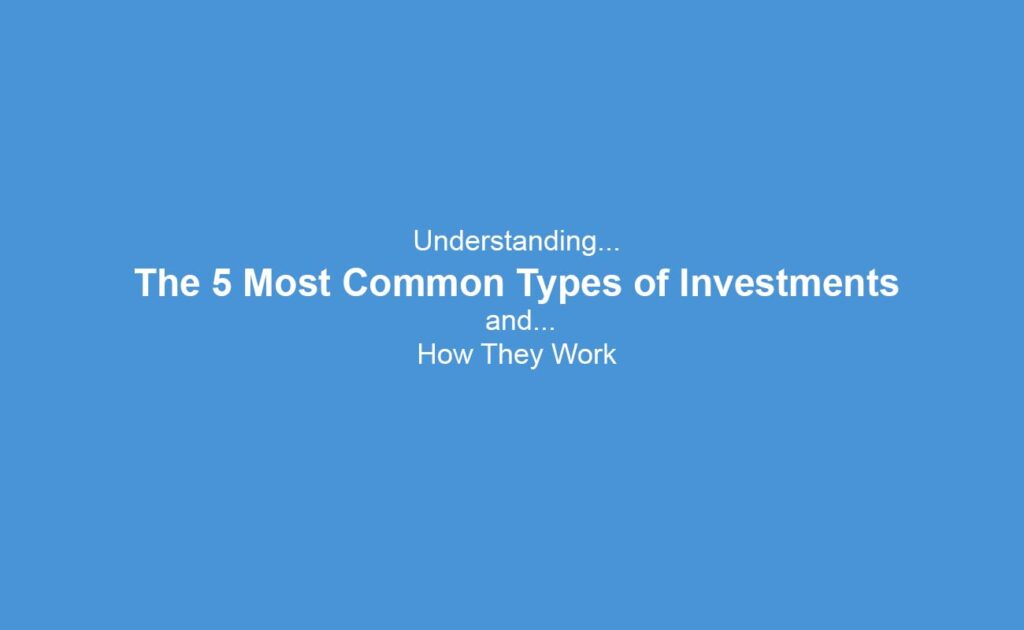Investing is one of the best ways to build wealth, but it can seem daunting due to the numerous options available. Since savvy investors know they should diversify their investment portfolios, so they learn about and try to understand as many options as possible.
Each has upsides and downsides, and knowing how they work will help you decide whether it would be a great addition to your portfolio, no matter if you are a beginner or a seasoned investor. This guide will walk you through five of the most common and popular types of investments, explaining how each works along the way.
Commodities
Commodities are raw materials or agricultural products that can be sold and bought on a market. They are considered low-risk investment options and excellent for beginners and investors with a low risk tolerance.
The four main types of commodities include:
- Energy – Oil, natural gas, and petroleum products
- Livestock – Feeder cattle, beef, pork bellies, chicken, and others
- Agricultural – Wheat, soybeans, and corn
- Metals – precious metals such as silver and gold and industrial metals like copper
Every investor should understand the commodities they invest in and the factors that can affect their price. For example, the price of gold is impacted heavily by inflation and economic downturns, while that of agricultural commodities is affected by weather and disease.
Instead of buying and holding commodities, investors trade commodity futures instead. These are derivative contract agreements to sell or buy a specific commodity, security, or asset at a predetermined future date and price.
They also sometimes use them as a hedge against inflation, with gold being a superb option.
Stocks
Stocks are a very popular investment option as they are easy to understand and invest in. When you buy stocks, you are purchasing an ownership stake or part of a publicly traded company. Almost all the biggest companies in the world are publicly traded, so you can buy their shares through different stock exchanges or brokers.
So, how do stock investments make money? The main way is buying them at a low price and selling them at a higher one. While you can expect the stock prices of growing and legacy companies to increase over time, you should also understand the market to know when they might go down and the factors or events that might cause this.
Options
Options trading is somewhat advanced as it requires an understanding of trading strategies. It entails buying a contract that allows you to sell or buy an underlying asset at a predetermined and negotiated price (the strike price) at a future date. The underlying asset’s price determines the strike price.
The two main types of options contracts are call and put options. A call option allows you to buy the underlying stock at the agreed price, while a put option allows you to sell at the predetermined price.
A call option leads to a profit if the asset’s price increases and becomes higher than the strike price. For example, you can buy a call option with a $15 strike price. If the shares are worth $18 at execution, you profit $3 for each share. Since you are not obligated to execute the contract, you can let it expire if the stock price falls below the strike price.
A put option, on the other hand, makes money when the asset’s value falls below the strike price. The reason is that you will sell the contract at a higher price than the prevailing market rate, pocketing the difference. Say you bought a put option with a $15 strike price. If the price falls to $12, your profit per share is $3.
While they can be profitable, and you can use them to protect an investment, options can be difficult to master. However, you can learn option selling tips that can help you make a profit, especially in volatile markets with large trade volumes and price movements.
Mutual and Exchange-traded Funds
These funds are similar and are great investment options, but they have differences that you should know about if you want to invest in them. They are both a collection of investments and pool money from numerous investors. A major difference is that mutual funds are bought through a fund or fund company, while ETFs are traded on stock markets.
They can both be actively or passively managed. Passive management tracks a benchmark, usually an index like the Dow Jones Industrial Average or S&P 500. An actively managed fund has a manager who intends to outperform the market or a tracked benchmark.
Both can invest in different individual investment vehicles, including stocks, bonds, currencies, and commodities. Investors make money with both if the value of the underlying assets goes up. You can either keep them so they keep increasing your portfolio’s value, or can sell them if you need a return or funds quickly.
Government Savings and Corporate Bonds
Governments and different entities borrow money in different ways for various reasons. One of the ways they do this is by issuing bonds. Buying one means lending the government or issuing entity money. The issuer then has to pay interest on the “loan” at the end of the predetermined period (at maturity).
Bonds are considered almost risk-free because the only way to lose your investment is if the issuing entity fails or goes bankrupt. This is also the reason government bonds carry less risk than corporate bonds.
Since you hold bonds for multiple years, unless you sell prematurely, you should find ones that keep up and surpass inflation. If not, the amount you get at maturity will be worth less due to the reduced purchasing power caused by inflation.
The best option is, therefore, Treasury Inflation-Protected Securities (TIPS). These are securities issued by the US government and are adjusted in line with the inflation rate to reduce its effects on your investment and returns.
There are many ways to invest depending on factors like your goals, investment horizon, risk tolerance, and investment amount. While many are great for beginners, some are more advanced and require some research and learning. However, there are excellent resources all over the internet, including expert advice on how to make the most of each type of investment.








Leave a Comment
You must be logged in to post a comment.